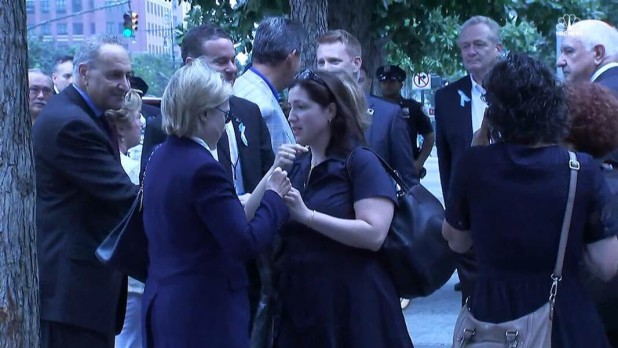Jazzhands McFeels
The Right Stuff
September 12, 2016
By now we’re all aware of Hillary’s medical issue that occurred at the 9/11 ceremony yesterday morning in New York City. Hillary was taken to Chelsea’s apartment instead of a hospital for several reasons: first and foremost, the campaign is already well-aware of what’s wrong with her, and in a close second, they have little to no control over her privacy in a hospital. As one can imagine, there was an enormous political calculus in determining whether or not to pull her out of the ceremony, to an extent that it weighed considerably against her health considerations. The optics of this were extremely damaging to her campaign and the video footage of her being loaded into a Secret Service van like a slab of meat made it exponentially worse.
The pneumonia diagnosis is being used to buy time and leave the public with the impression that she is suffering from something serious, but from which she can recover. With just 15 days until the first debate on September 26th, the decision to cancel her trip to California was a prudent one. The outside temperature was just 75 degrees when Clinton “fainted” this morning and, believe me, that debate stage is going to be much hotter under the lights, for upwards of 90 minutes, pitted against Donald Trump for the very first time.
The mainstreaming of Hillary’s health issues and the seriousness of this morning’s incident have raised many questions: What happens if she becomes incapacitated and drops out–or even dies? What if this happens before the election? What if it happens after, but before the inauguration? Can the party remove her as the nominee?
There’s been some disinformation floating around about this, including supposition that President Obama could delay the election (he cannot–unless Congress acts, the election is Constitutionally mandated to occur as scheduled) or they could just run Biden. There are also complications given we are now less than 60 days from Election Day and early voting has already started in some states. Based on what we know today, here are some possibilities:
What happens if Hillary drops out before the election?
If Hillary drops out or dies before the general election, the Democratic National Committee could replace her, but only after reconvening a meeting of the committee members in-person and after a quorum has been reached in that meeting. This is outlined in Article 2, Sections 7 & 8 of the DNC’s bylaws:
Section 7 states:
A special meeting to fill a vacancy on the National ticket shall be held on the call of the Chairperson, who shall set the date for such meeting in accordance with the procedural rules provided for in Article Two, Section 8(d) of these Bylaws.
Section 8 states:
A majority of the full membership of the Democratic National Committee present in person or by proxy shall constitute a quorum, provided that no less than forty percent (40%) of the full membership be present in person for the purpose of establishing a quorum; provided, however, that for purposes of voting to fill a vacancy on the National ticket, a quorum shall be a majority of the full membership present in person.
This is different from the RNC rules, which state that the RNC has to either convene a new convention or take an official poll of the RNC’s state representatives in order to determine who would fill the vacated slot on the ticket. It’s likely they would move the VP up to keep the fundraising for the ticket that had already been done.
There aren’t currently any rules in place to remove Hillary as the nominee. Ultimately, that decision must be made by her. The takeaway from the DNC rules is that they would not have to reconvene their convention in order to choose a new presidential nominee in the event that the slot was vacated. Similar to the RNC scenario, keeping Kaine on the ticket or moving him up as the presidential nominee would keep the campaign and fundraising done thus far intact. However this is not guaranteed.
Who would replace Hillary would obviously be entirely political at this stage of the race, especially with regard to whether or not that person could beat Donald Trump. Another factor working against Kaine is the popularly-held view that his presence on the ticket was the result of a deal brokered back in 2008, so he may not have the necessary loyalty with DNC members. Possibilities to replace Clinton include Joe Biden (perhaps their first choice), Elizabeth Warren, or Bernie Sanders. Contrary to some speculation, Bernie is not entitled to a spot on the ticket. Some less likely picks might include Andrew Cuomo, Corey Booker, Jim Webb, or Martin O’Malley.
Even though this is an option Democrats could exercise up until Election Day, there are open questions related to the legality of changing election ballots and whether or not simply swapping out the nominee is even feasible given early voting has already started in many states. It may not only be too late to reprint them, but it would also violate many state election laws. It’s also entirely possible it may simply be too late. We are in uncharted political territory.
This is supported by an article in Slate back in October 2000 entitled Dead President Elect – What if Al Gore or George W. Bush got hit by a truck? In it the conventional wisdom states that it is entirely unclear what would happen if a candidate drops out so close to the election.
What if she is incapacitated or dies after winning the election, but before the Electoral College convenes in December?
If she is incapacitated or dies between the general election and when members (electors) of the electoral college meet (on the first Monday after the second Wednesday in December after the presidential election), according to federal law:
If a candidate dies or becomes incapacitated between the general election and the meeting of electors, under federal law, the electors pledged to the deceased candidate may vote for the candidate of their choice at the meeting of electors. Individual states may pass laws on the subject, but no federal law proscribes how electors must vote when a candidate dies or becomes incapacitated.
What if she is incapacitated or dies after the Electoral College electors cast their votes, but before the inauguration?
Also in the event that she is incapacitated or dies between when the electors cast their ballots and the votes are counted in Congress, federal law states:
…the Constitution is silent on whether this candidate meets the definition of “President elect” or “Vice President elect.” If the candidate with a majority of the electoral votes is considered “President elect,” even before the counting of electoral votes in Congress, Section 3 of the 20th Amendment applies. Section 3 of the 20th Amendment states that the Vice President elect will become President if the President elect dies or becomes incapacitated.
What’s next?
Aside from the pneumonia diagnosis and the cancellation of her California trip, we’ve heard little from the campaign. There are, however, rumors floating around about the possibility of the DNC convening an emergency meeting to consider a replacement for Clinton.
Clarification from dem operatives @HillaryClinton pneumonia: Expect emergency DNC meeting to CONSIDER replacement. #HillarysHealth
— David Shuster (@DavidShuster) September 11, 2016
Buckle up. We have a very interesting week ahead.

